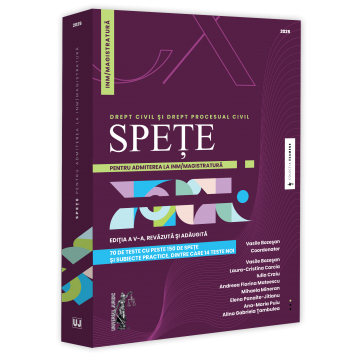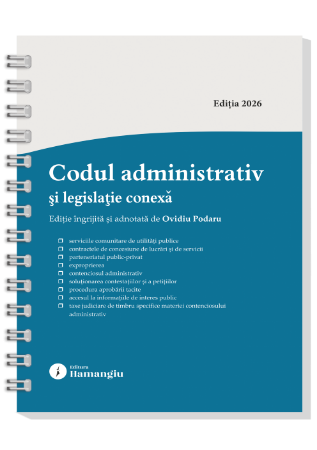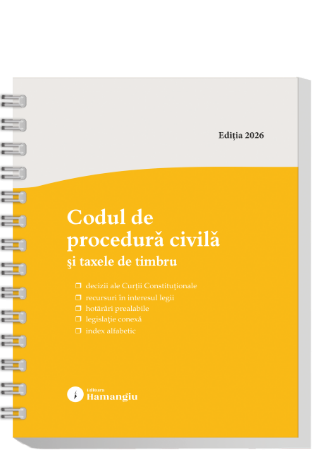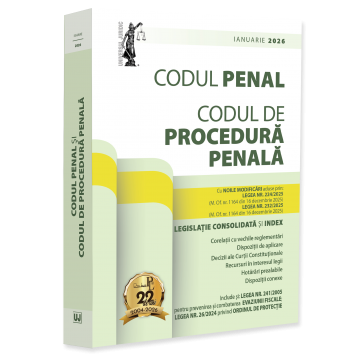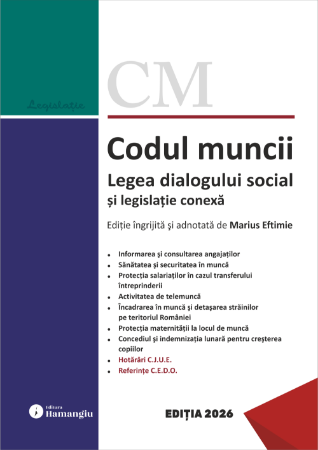Manuscript proposals: [email protected] / 0745 204 115 //// Tracking orders Individuals / Sales: 0745 200 357 / Orders Legal entities: 0721 722 783
ISBN: 978-606-28-0916-4
DOI: 10.5682/9786062809164
Publisher year: 2019
Edition: I
Pages: 330
Publisher: Editura Universitară
Author: Dragos Calin
Product Code:
9786062809164
Do you need help?
0745 200 357
- Description
- Download (1)
- Authors
- Content
- More details
- Reviews (0)
Mobbing (harassment at work) is any abusive behavior - through gestures, words, attitudes - that harms, through its systematic nature or repetition, the dignity or physical or mental integrity of a person, endangering his work or degrading the climate for work.
This volume brings together some of the most significant court rulings handed down by Romanian courts in the field, being extremely useful, first of all, for magistrates and lawyers, but also for any other interested persons, mobbing being a reality impossible to ignore and with consequences. one of the most unpredictable and unfortunate.
Product compliance information
This volume brings together some of the most significant court rulings handed down by Romanian courts in the field, being extremely useful, first of all, for magistrates and lawyers, but also for any other interested persons, mobbing being a reality impossible to ignore and with consequences. one of the most unpredictable and unfortunate.
Author
-
MOBBINGUL. HARTUIREA LA LOCUL DE MUNCA. Culegere de jurisprudenta
Download
Dragos Calin
Judge at the Bucharest Court of Appeal, trainer of the National Institute of Magistracy for continuous professional training European Union law, international judicial cooperation in civil and commercial matters, labor law and social insurance law; associate scientific researcher of the Institute of Legal Research of the Romanian Academy - Center for European Law Studies, director of the Forum of Judges, member of the scientific college of the journal Jurisclasor ECHR, co-editor of the journal iaduer.ro - European Legal Affairs, founding member and co-president Romanian Judges Forum Association (2007-present), member of the GEMME Europe Board of Directors (May 2010-present), vice-president of GEMME Europe - European Grouping of Magistrates for Mediation (May 2010-May 2012), founding member of CIMJ International Conference on Mediation for Justice), October 2009, Paris
Judge at the Bucharest Court of Appeal, trainer of the National Institute of Magistracy for continuous professional training European Union law, international judicial cooperation in civil and commercial matters, labor law and social insurance law; associate scientific researcher of the Institute of Legal Research of the Romanian Academy - Center for European Law Studies, director of the Forum of Judges, member of the scientific college of the journal Jurisclasor ECHR, co-editor of the journal iaduer.ro - European Legal Affairs, founding member and co-president Romanian Judges Forum Association (2007-present), member of the GEMME Europe Board of Directors (May 2010-present), vice-president of GEMME Europe - European Grouping of Magistrates for Mediation (May 2010-May 2012), founding member of CIMJ International Conference on Mediation for Justice), October 2009, Paris
Content
Moral harassment at work can be defined as any abusive behavior, through gestures, words, attitudes that harm their systematic nature or by repeating the dignity or physical or mental integrity of a person, endangering his work or degrading the climate of work. the work. In order to retain the existence of mobbing (moral harassment of the employee at work), the court must find that it has been subjected to acts of intense psychological pressure, repeatedly, from other employees colleagues or superiors. In order for a certain behavior to reach the connotations of mobbing, it was considered that it must take place over a period of at least six months and aim at adopting at least one of the behaviors characterized as actions to restrict the victim's ability to express: actions aimed at isolation of the victim; actions of disregarding the victim in front of colleagues; actions of professional discredit of the victim; actions aimed at compromising the victim's health / 25
Bucharest Tribunal - Section VIII labor disputes and social insurance, Civil sentence no. 4772 of June 12, 2018
Mobbing is an illicit act consisting in subjecting the employee to certain types of actions which, taken individually, do not have an illicit character, but which are considered unitary and result as annoying and exercised with persecutory purpose, so as to cause the employee an attitude of humiliation continuing to practice the profession. If the employer is found guilty of moral harassment committed by one of his employees, he has the following obligations: to sanction the employee who is the perpetrator of the harassment (according to the Labor Code) and to take measures to prevent and combat such behavior 38
Bucharest Tribunal - Section VIII labor disputes and social insurance, Civil sentence no. 1471 of February 20, 2018
It is a matter of moral harassment to prohibit other employees from meeting with the applicant, after she has announced that she is pregnant, not to receive her at work or to refuse to issue certificates of salary and payment of sick leave / 46
Bucharest Court of Appeal - Section VII for cases regarding labor disputes and social insurance, Civil Decision no. 4563 of September 28, 2016, final
Given that the prohibition of moral harassment has as legal purpose the protection of the dignity of the person at work, based on art.1247 paragraph 1 of the Civil Code, applicable under art.278 of the Labor Code, the legal sanction that intervenes is the absolute nullity of the acts concluded in violation of the prohibition. In this sense, moral harassment is not a simple vice of consent, but is a violation of a provision established for the protection of a fundamental value of the state. Mobbing is a destructive process; it consists of hostile actions which, taken in isolation, may seem innocuous, but by constant repetition have dangerous effects / 62
Iasi Court of Appeal - Labor Litigation and Social Insurance Section, Civil Decision no. 338 of May 15, 2018, final
The request for monitoring the applicant's activity, teacher, addressed by the educational unit to the School Inspectorate of Bucharest, was justified by the notifications of the students 'parents, regarding the applicant's didactic activity and especially the students' evaluation, not being able to appreciate that the purpose intimidation of the employee, her moral harassment / 83
Bucharest Tribunal - Section VIII labor disputes and social insurance, Civil sentence no. 4884 of June 26, 2017, final
A conflicting atmosphere at work has the ability to cause inconvenience, but it does not automatically give rise to the right to receive moral compensation, if a certain injury of this nature does not occur, respectively the employee did not yield to the alleged acts of intimidation , humiliation, injury, annihilation, but resisted, taking advantage of the professional environment that allowed him to react: by factual oppositions, by legal defenses (appeal to specialized help of lawyers, contesting measures, procedures, complaints, petitions), by expressing points of view, refusing to respond to certain claims of the employer and his proxies in the conduct of daily employment or during certain procedures, etc. Personal psycho-behavioral censorship does not interfere with the phenomenon of harassment at work, if it does not result that the incident is part of a line of concerted actions of the employer to seek to overwhelm the innocent employee, to cause him to quit work or to the capitalization of his legitimate rights and interests / 90
Bucharest Court of Appeal - Section VII for cases regarding labor disputes and social insurance, Civil Decision ila no.4130 of October 12, 2018, final
The fact that the plaintiff was ordered to hand over the service car at the end of each day does not constitute an abusive act of the employer, likely to materialize a moral harassment, the service car being assigned for the performance of duties and this measure was not applied only to the applicant , witnesses heard confirming that they were subject to similar provisions regarding the service car / 120
Bucharest Tribunal - Section VIII labor disputes and social insurance, Civil sentence no. 7330 of October 18, 2017, final
Given that the distribution of vocal soloists in a certain show is done by the director and conductor of that show, as only they are responsible for the quality of the show from a directorial and musical point of view, the employer of the Romanian National Opera Iasi can have a consultative role, the existence of an illicit deed of the employer cannot be retained, consisting in “non-distribution of the plaintiff in opera performances on stage”, likely to determine moral harassment / 130
Iasi Court of Appeal - Labor Litigation and Social Insurance Section, Civil Decision no. 617 of October 18, 2017, final
The tolerance of the situation tense by the employer's management and the public expression of a defamatory labeling opinion of the employee, in the absence of the initiation of disciplinary investigation, paints a situation of mobbing / 147
Iasi Tribunal - Civil Section I Civil sentence no. 780 of April 25, 2016, final
Placing an employee in a "ghost" position, related to his position in the company before the restructuring and to the professional ambitions inherent in a successful career, denotes a degrading situation, the employer's behavior can be qualified as moral harassment at work / 162
Bucharest Court of Appeal - Section VII for cases regarding labor disputes and social insurance, Civil Decision no. 3112 of May 19, 2017, final
Ensuring and promoting health at work involves a healthy work environment, the participation of all employees in this process and encouraging personal development. This involves not only compliance with legal requirements in the field of health and safety, but also the active support of employees by employers in order to improve their general health and comfort. Although safety and health at work is closely linked to the assessment of occupational risks, an important component is the psychosocial risk generated, among others, by individual skills (conception, organization and poor management of the activity) and inappropriate social context at work. for work. In this last situation is included the psychological harassment exercised, as a rule, within an unequal power relationship that involves a hostile, unethical communication, systematically directed at an individual / group of individuals, the consequence being the placement in a situation of helplessness, in which cannot / cannot be defended / 185
Bucharest Court of Appeal - Section VII for cases regarding labor disputes and social insurance, Civil Decision no. 5033 of October 18, 2017, final
Mobbing is the exercise of mental stress on someone at work, for example, through mental terror, repeated harassment at work, school, sports club, internet. Typical actions for mobbing are attacks on a person's dignity through verbal and physical violence, insults or the frequent spread of untrue information about the harassed person, in order to isolate and torment them. The fact that the appellant was forbidden to use the company's Bucharest office, because his new area of activity is represented by the counties of Moldova, is no more than a simple exercise by the employer of the attributions conferred by art. 40 paragraph 1 of the Labor Code. The fact that his requests for advance were approved late.
Moral harassment at work can be defined as any abusive behavior, through gestures, words, attitudes that harm their systematic nature or by repeating the dignity or physical or mental integrity of a person, endangering his work or degrading the climate of work. the work. In order to retain the existence of mobbing (moral harassment of the employee at work), the court must find that it has been subjected to acts of intense psychological pressure, repeatedly, from other employees colleagues or superiors. In order for a certain behavior to reach the connotations of mobbing, it was considered that it must take place over a period of at least six months and aim at adopting at least one of the behaviors characterized as actions to restrict the victim's ability to express: actions aimed at isolation of the victim; actions of disregarding the victim in front of colleagues; actions of professional discredit of the victim; actions aimed at compromising the victim's health / 25
Bucharest Tribunal - Section VIII labor disputes and social insurance, Civil sentence no. 4772 of June 12, 2018
Mobbing is an illicit act consisting in subjecting the employee to certain types of actions which, taken individually, do not have an illicit character, but which are considered unitary and result as annoying and exercised with persecutory purpose, so as to cause the employee an attitude of humiliation continuing to practice the profession. If the employer is found guilty of moral harassment committed by one of his employees, he has the following obligations: to sanction the employee who is the perpetrator of the harassment (according to the Labor Code) and to take measures to prevent and combat such behavior 38
Bucharest Tribunal - Section VIII labor disputes and social insurance, Civil sentence no. 1471 of February 20, 2018
It is a matter of moral harassment to prohibit other employees from meeting with the applicant, after she has announced that she is pregnant, not to receive her at work or to refuse to issue certificates of salary and payment of sick leave / 46
Bucharest Court of Appeal - Section VII for cases regarding labor disputes and social insurance, Civil Decision no. 4563 of September 28, 2016, final
Given that the prohibition of moral harassment has as legal purpose the protection of the dignity of the person at work, based on art.1247 paragraph 1 of the Civil Code, applicable under art.278 of the Labor Code, the legal sanction that intervenes is the absolute nullity of the acts concluded in violation of the prohibition. In this sense, moral harassment is not a simple vice of consent, but is a violation of a provision established for the protection of a fundamental value of the state. Mobbing is a destructive process; it consists of hostile actions which, taken in isolation, may seem innocuous, but by constant repetition have dangerous effects / 62
Iasi Court of Appeal - Labor Litigation and Social Insurance Section, Civil Decision no. 338 of May 15, 2018, final
The request for monitoring the applicant's activity, teacher, addressed by the educational unit to the School Inspectorate of Bucharest, was justified by the notifications of the students 'parents, regarding the applicant's didactic activity and especially the students' evaluation, not being able to appreciate that the purpose intimidation of the employee, her moral harassment / 83
Bucharest Tribunal - Section VIII labor disputes and social insurance, Civil sentence no. 4884 of June 26, 2017, final
A conflicting atmosphere at work has the ability to cause inconvenience, but it does not automatically give rise to the right to receive moral compensation, if a certain injury of this nature does not occur, respectively the employee did not yield to the alleged acts of intimidation , humiliation, injury, annihilation, but resisted, taking advantage of the professional environment that allowed him to react: by factual oppositions, by legal defenses (appeal to specialized help of lawyers, contesting measures, procedures, complaints, petitions), by expressing points of view, refusing to respond to certain claims of the employer and his proxies in the conduct of daily employment or during certain procedures, etc. Personal psycho-behavioral censorship does not interfere with the phenomenon of harassment at work, if it does not result that the incident is part of a line of concerted actions of the employer to seek to overwhelm the innocent employee, to cause him to quit work or to the capitalization of his legitimate rights and interests / 90
Bucharest Court of Appeal - Section VII for cases regarding labor disputes and social insurance, Civil Decision ila no.4130 of October 12, 2018, final
The fact that the plaintiff was ordered to hand over the service car at the end of each day does not constitute an abusive act of the employer, likely to materialize a moral harassment, the service car being assigned for the performance of duties and this measure was not applied only to the applicant , witnesses heard confirming that they were subject to similar provisions regarding the service car / 120
Bucharest Tribunal - Section VIII labor disputes and social insurance, Civil sentence no. 7330 of October 18, 2017, final
Given that the distribution of vocal soloists in a certain show is done by the director and conductor of that show, as only they are responsible for the quality of the show from a directorial and musical point of view, the employer of the Romanian National Opera Iasi can have a consultative role, the existence of an illicit deed of the employer cannot be retained, consisting in “non-distribution of the plaintiff in opera performances on stage”, likely to determine moral harassment / 130
Iasi Court of Appeal - Labor Litigation and Social Insurance Section, Civil Decision no. 617 of October 18, 2017, final
The tolerance of the situation tense by the employer's management and the public expression of a defamatory labeling opinion of the employee, in the absence of the initiation of disciplinary investigation, paints a situation of mobbing / 147
Iasi Tribunal - Civil Section I Civil sentence no. 780 of April 25, 2016, final
Placing an employee in a "ghost" position, related to his position in the company before the restructuring and to the professional ambitions inherent in a successful career, denotes a degrading situation, the employer's behavior can be qualified as moral harassment at work / 162
Bucharest Court of Appeal - Section VII for cases regarding labor disputes and social insurance, Civil Decision no. 3112 of May 19, 2017, final
Ensuring and promoting health at work involves a healthy work environment, the participation of all employees in this process and encouraging personal development. This involves not only compliance with legal requirements in the field of health and safety, but also the active support of employees by employers in order to improve their general health and comfort. Although safety and health at work is closely linked to the assessment of occupational risks, an important component is the psychosocial risk generated, among others, by individual skills (conception, organization and poor management of the activity) and inappropriate social context at work. for work. In this last situation is included the psychological harassment exercised, as a rule, within an unequal power relationship that involves a hostile, unethical communication, systematically directed at an individual / group of individuals, the consequence being the placement in a situation of helplessness, in which cannot / cannot be defended / 185
Bucharest Court of Appeal - Section VII for cases regarding labor disputes and social insurance, Civil Decision no. 5033 of October 18, 2017, final
Mobbing is the exercise of mental stress on someone at work, for example, through mental terror, repeated harassment at work, school, sports club, internet. Typical actions for mobbing are attacks on a person's dignity through verbal and physical violence, insults or the frequent spread of untrue information about the harassed person, in order to isolate and torment them. The fact that the appellant was forbidden to use the company's Bucharest office, because his new area of activity is represented by the counties of Moldova, is no more than a simple exercise by the employer of the attributions conferred by art. 40 paragraph 1 of the Labor Code. The fact that his requests for advance were approved late.
This volume brings together some of the most significant court rulings handed down by Romanian courts in the field of mobbing.
Mobbing at work (mobbing) can be defined as any abusive behavior, through gestures, words, attitudes that harm, by their systematic character or by repetition, the dignity or physical or mental integrity of a person, endangering his work or degrading the work climate. Therefore, we are talking about a repeated and abnormal behavior towards an employee or a group of employees, which is likely to generate a risk for those employees.
The phenomenon of harassment was initially described in sociological context by Konrad Lorentz, in the paper "On Aggression", published in 1963. In 1984, the concept was adapted to work relations by Heinz Leymann (PhD in occupational psychology, professor at Stockholm University ), which identified the central elements of mobbing and 45 types of behaviors:
“• the systematic, repeated and lasting nature of the persecutory behavior. It was considered that it must take place over a period of at least six months;
• adopting at least one of the following behaviors, classified according to the effects on the victim:
a. Actions to prevent the victim from expressing himself:
- the hierarchical superiors deny the victim the possibility to express himself;
- the victim is frequently interrupted when speaking;
- colleagues prevent the victim from expressing himself;
- colleagues scream, offend the victim;
- the victim's activity is criticized;
- the victim's private life is criticized;
- the victim is terrorized by phone calls;
- the victim is verbally threatened;
- threatening the victim in writing;
- refusing contact with the victim (avoid visual contact, make gestures of rejection, etc.);
- ignoring the victim's presence (for example, addressing another person, as if the victim were not present).
b. Actions aimed at isolating the victim:
- never talk to the victim;
- the victim is not allowed to address another person;
- the victim is assigned another position that removes her and isolates her from colleagues;
- colleagues are forbidden to talk to the victim;
- the physical presence of the victim is denied.
c. Actions that involve disregarding the victim in front of colleagues:
- the victim is spoken ill or slandered;
- rumors are launched against the victim;
- the victim is ridiculed;
- it is claimed that the victim is mentally ill;
- the victim is forced to appear for a psychiatric examination;
- a disability of the victim is invented;
- the actions, gestures, voice of the victim are imitated in order to ridicule her better;
- the religious beliefs or political beliefs of the victim are attacked;
- jokes about the victim's private life;
- jokes about the origin or nationality of the victim;
- the victim is forced to accept humiliating activities;
- unfair evaluation of the victim's work;
- the victim's decisions are contested;
- aggression of the victim in obscene or insulting terms;
- sexual harassment of the victim (gestures or proposals).
d. Professional discrediting of the victim:
- he is not assigned tasks to perform;
- deprivation of any occupation and ensuring that the victim does not find any occupation alone;
- entrusting unnecessary or absurd tasks;
- granting inferior activities to competencies;
- permanent assignment of new tasks;
- imposing the execution of humiliating tasks;
- entrusting tasks superior to the qualification in order to discredit the victim.
e. Compromising the victim's health:
- entrusting dangerous and harmful tasks for health;
- threat of physical violence;
- physical aggression of the victim, without gravity, as a warning;
- serious physical aggression;
- expenses are intentionally incurred to the victim, with the intention to cause damages;
- causing discomfort at home or at work;
- sexual assault of the victim.
• the progressive evolution of the vexatious behavior, as follows:
1. The first phase - divergent opinions, slight interpersonal conflicts that can be resolved, but which remain unresolved and can degenerate into mobbing.
2. The second phase - the gradual installation of mobbing, through repeated aggressive actions directed by one person or a group of persons on another person. Gradually, the victim's mental balance is affected, self-confidence is disrupted, stress appears.
3. The third phase - the need for the intervention of the organization's management, which does not take place most of the time, the conflicts being left to smolder, and the aggressed people are not defended, or it takes place much too late, when the situation can no longer be controlled.
4. Phase four - stigmatization, social isolation, removal of the victim from work, which reduces its chances of getting a job.
• serious pathological consequences in terms of news of the employee's person. "
The causes of mobbing can be the quantitative overload or the qualitative underload of the position, as well as the lack of clear rules and delimitations of the attributions.
Mobbing at work (mobbing) is not expressly regulated in the primary legislation of Romania, there are no direct provisions, but only some indirect provisions.
In general terms, art. 5 of the Labor Code stipulates that, “within the labor relations, the principle of equal treatment towards all employees and employers works. Any direct or indirect discrimination against an employee, based on criteria of sex, sexual orientation, genetic characteristics, age, national affiliation, race, color, ethnicity, religion, political choice, social origin, disability, family situation or responsibility, affiliation or trade union activity is prohibited. " According to Article 8 paragraph (1) of the Labor Code, labor relations are based on the principle of good faith, which means that all actions of the employer must be limited to this principle, and pursuant to Article 39 paragraph (1) letter. e, f, the employee has the right to dignity at work and to safety and health at work, the scope of this right including both physical and mental health and safety. Also, art. 253 of the Labor Code stipulates that the employer is obliged, under the norms and principles of contractual civil liability, to compensate the employee in case he suffered material or moral damage due to the employer's fault during the performance of duties or in connection with the service .
The national legislation protects, in principle, the individual against acts of harassment, thus according to art. 2 paragraph (5) of the Government Ordinance no. 137/2000 constitutes harassment and is sanctioned contraventionally “any behavior on the basis of race, nationality, ethnicity, language, religion, social category, beliefs, gender, sexual orientation, belonging to a category disadvantaged, age, disability, refugee or asylum status or any other criterion that leads to the creation of an intimidating, hostile, degrading or offensive environment ”.
More specifically, art. 4 paragraph 1 letter d ind.1 of Law no. 202/2002 on equal opportunities and treatment between women and men, introduced by Law no. 229/2015, defines psychological harassment as “any inappropriate behavior that occurs over a period of time, is repetitive or systematic and involves physical behavior, oral or written language, gestures or other intentional acts that could affect personality, dignity or integrity physical or psychological condition of a person ”.
The term "mobbing" is used only in two acts published in the Official Gazette of Romania, Part I or Part V:
• Framework methodology of January 19, 2011 on prevention and intervention in the multidisciplinary and networked team in situations of violence against children and domestic violence approved by Government Decision no. 49/2011
“Other definitions: 1. Bullying defines bullying in school by another classmate. 2. The Lolita phenomenon refers to the possible link between modeling and advanced child erotography when model girls pose with the physical expressiveness and erotic attire of women in modeling, and their pictures reach the Internet, being exploited - some states subsume child pornography. 3. Grooming is a mode of action by which a person with pedophile inclinations prepares the transfer of the relationship with a minor from the computer screen in the real world, in order to commit a crime against sexual life against that minor. 4. The intervention represents the actions and activities carried out by the professionals from the multidisciplinary team and from the intervention network with the purpose of evaluation, formulation of a multidimensional diagnosis and implementation of the PIP / rehabilitation plan and / or social reintegration. 5. Lolicon is an erotic and / or pornographic cartoon that uses images of girls. 6. Mobbing is a form of emotional abuse of a child who is constantly discredited, psychologically intimidated, mentally assaulted, offended, ridiculed, ridiculed, isolated, persecuted, terrorized by a group of colleagues at school or work. ”
• The collective labor contract no. 503 of June 21, 2017 at the Level of Group of Units in the Activity Sector "Higher Education"
Article 3 (1) - The Collective Labor Agreement at Group Level of Units in the Sector of Activity "Higher Education", hereinafter referred to as collective labor agreement, aims to establish the mutual rights and obligations of the employer and employees union members and aims to promote and guarantee fair labor relations, such as to ensure the social protection of employees. (2) Regarding the specific working conditions, determined according to the law, the rights and obligations of the parties will be established through the collective labor contracts concluded at the level of higher education institutions and of the central university libraries. The employer has all the rights and obligations deriving from the legislation in force. (3) The contracting parties ensure the application of the clauses of the present collective labor contract for the members of the unions affiliated to F.N.S. Alma Mater, in accordance with the law. (4) The employer recognizes the free exercise of the trade union right, the freedom of opinion of each employee according to the Romanian Constitution, the national legislation, as well as the international conventions that Romania has ratified. when establishing individual rights, employers shall comply with the legal provisions in force regarding the application of the principle of equal opportunities and treatment to all employees, without discrimination. (6) Any employee who performs a job benefits from working conditions adequate to the activity carried out, social protection, safety and health at work, as well as respect for his dignity and conscience, without any discrimination.
The employer has the obligation to ensure the safety, health and safety of employees in all aspects related to work and to avoid psychosocial risk factors in labor relations. Any form of psychological harassment (mobbing) or physical harassment (bullying) is prohibited in the academic environment, as well as any behavior that may lead to degradation, humiliation or intimidation and that may affect a person's autonomy and ability to perform. naturally professional and study responsibilities, or to exercise their rights. By psychological harassment (mobbing type) is meant a chronic emotional conflict, in which an employee is involved who is attacked, stigmatized by colleagues or bosses in any way, whether through jokes and rumors, intimidated, humiliated, discredited or isolated, receives more tasks than he can perform, whether he is ridiculed or unjustly accused, and through one or more of these actions his emotional state and professional life are endangered, leading to an accentuated state of stress, low self-esteem, anxiety, decreased labor power, produces behavioral disorders or alters the psychophysiological balance. Physical harassment (bullying) means a conflict generated by aggressive physical actions, in which an employee is involved, if they are directly or indirectly affected by the way in which the victim of these aggressions performs his duties, causing -severe disorders or inconveniences likely to diminish his work capacity. The essential elements that differentiate psychological harassment (mobbing) / physical harassment (bullying) from stress at work can be: - Intentional negative actions are exercised / sustained by a group of people; - harassment actions have a frequency and duration of more than six months; - there is an asymmetrical power relationship between the aggressor and the victim. The employer undertakes to remove the causes of psychological harassment (mobbing) / physical harassment (bullying), such as: - individual disturbing factors reported, if they are the factors that prepare the ground; - deficiencies in human resources management; - tolerance towards moral harassment and its non-recognition as a problem; - the dynamics of the groups in the organization - the rapid organizational changes; - job insecurity; - deficient relations between work colleagues - type of work tasks, socio-organizational environment, work organization; - personality traits; - organizational stress; - discrimination; - intolerance; - personal problems. The employee, as well as the employer to make joint efforts to avoid conflict situations and to improve the psychosocial climate at work by: - the possibility of each employee to choose how they perform their work tasks; - reduction of monotonous and repetitive activities; - providing additional information on the objectives of the activity; - developing leadership skills; - avoiding confusions regarding the role and work tasks; - participation in psychological counseling, when appropriate, of the victim of psychological harassment (mobbing) / physical harassment (bullying); - continuous improvement of the relationship between colleagues - cultivation of mutual respect and appreciation in professional relationships. "
Art.26 point 2 of the European Social Charter (“The right to dignity at work”), ratified by Romania by Law no. 74/1999, provides the following: “in order to ensure the effective exercise of the right of all workers to the protection of their dignity at work , the parties undertake, in consultation with employers 'and workers' organizations: 1) to promote awareness, information and prevention in matters of sexual harassment at work or in connection with work and to take any appropriate measures to protect their work. against such behaviors; 2) to promote awareness, information and prevention on reprehensible or explicitly hostile and offensive acts, repeatedly directed against any employee at work or in connection with work, and to take any appropriate measures to protect workers against such behavior ”.
As regards the rules of the European Union, Council Directive 89/391 / EEC of 12 June 1989 on the implementation of measures to encourage improvements in the safety and health of workers at work establishes that the employer is responsible for the health and safety of employees at work. work, including the risk of mobbing.
The Charter of Fundamental Rights of the European Union stipulates, in art.31 par.1 (“Fair and just working conditions”), that (1) Every worker has the right to working conditions that respect his health, safety and dignity. ”
Directive 2000/43 / EC implementing the principle of equal treatment between persons irrespective of racial or ethnic origin and Directive 2000/78 / EC establishing a general framework for equal treatment with regard to
employment and employment establish guidelines on equal treatment in employment and occupation.
European Parliament resolution 2001/2339 on moral harassment at work calls on the Member States to review or supplement their own legislation in the fight against bullying and sexual harassment at work, to verify and standardize the definition of the term bullying and to develop strategies against mobbing and any form of violence at work.
However, the concept has been developed jurisprudentially, including in Romania, as can be seen by reading the present volume, therefore we do not yet reveal aspects in this regard. However, the Romanian jurisprudence seems well anchored to the solutions of judges from other states, the selection presented below being extremely useful:
● Mobbing is an illicit act consisting in subjecting the employee to certain types of actions which, taken individually, do not have an illicit character, but which - considered unitary - result as annoying and exercised with persecutory purpose, so as to determine in the employee an attitude of humiliation related to continuing to practice the profession. In the case of mobbing, the violation of the fundamental rights of the employee creates an existential prejudice that can be individualized in diminishing the esteem at work and the professional image of the employee, resized without guilt on his part following the conduct of colleagues (horizontal mobbing) or superiors (vertical mobbing ); the prejudice of the professional image of the employee will be covered in the sense of art. 2059 of the Italian Civil Code (non-pecuniary damage is recognized only in cases provided by law). - Forli Court, Italy, Judgment of 10 March 2005
● The employer is obliged to indemnify him from the employee, when the damage is the consequence of the implementation of a conduct of moral harassment by colleagues, if it is proved that the hierarchical superior, having knowledge of these incorrect behaviors, did nothing to he interrupts them. - Italian Court of Cassation, Decision no. 18262/2007
● In order to obtain moral damages, the employee must demonstrate the causal link between the illness and the plurality of behaviors that are part of a precise persecution strategy implemented by the employer in order to isolate him physically and mentally. In particular, harassing behaviors must be repeated - with continuity - over at least six months. - Milan Court, 29 October 2004, Italian Court of Cassation, Judgment no. 22858/2008
● The evidence shows that there is no sexual harassment of a journalist working for a sports news agency, who explained that, following the arrival of a new editor, her professional situation suddenly deteriorated: her more interesting activities, her work was frequently criticized in public, she was often insulted and abrupt, she was given tendentious remarks, especially about her marriage, and her colleagues called her "bichounette", "beautiful child". "Or" little T. " and they asked him to make them coffee.
Even if the language used in the writing was not sanctioned, it does not appear that he had a sexual connotation or was so rude that it could be described as an unwanted behavior of a sexual nature. The existence of the mobbing was not established either, not proving that the journalists had marginalized or excluded the applicant from her job.
The fact that the sports press is part of the traditional circles of males, in which women are still struggling to find their place, has not been taken into account. - The Federal Court of Switzerland, Decision no. 4C.276 / 2004 of 12 October 2004
● The fact that the person who claims to be the victim of harassment later receives an apology from the alleged perpetrator does not exempt the employer from his obligation to protect his employees. The mere fact that the alleged perpetrator did not behave strangely does not lead to the conclusion that there is no harassment, as he is not obliged to act insidiously or hypocritically. - The Federal Court of Switzerland, Decision no. 8C_41 / 2017 of December 21, 2017
● Psychological harassment, commonly known as mobbing, is a series of hostile acts that are frequently repeated over a long period of time, through which one or more individuals try to isolate, marginalize, or even exclude a person from his or her place of employment. the work. It often happens that each act, taken in isolation, still seems tolerable, but the actions taken as a whole constitute a destabilization of the personality, likely to determine the professional elimination of the employee. - The Federal Court of Switzerland, Decision no. 8C_398 / 2016 of 17 May 2017
● Moral harassment may result from deteriorating employment relationships related to the employee's individual relationships with his or her superior or co-worker. Thus, in the case of an employee whose mobile phone provided by the employer for professional use was taken away and he was introduced without justification the obligation to appear daily in the superior's office or, every morning, being assigned tasks that are not related to Its functions, all these facts are generating a depressed state, established from a medical point of view. - Court of Cassation of France, Social Section, Decision of 27 October 2004, case n ° 04-41.008
● Moral harassment can also result from the actions of a person against several employees of a company, characterized by repeated acts of threat, denigration, intimidation and sanctions applied against them. - French Court of Cassation, Social Section, Decision of 21 June 2006, Case No. 05-43.914
● The difficulties denounced by a client of the employer justify a consolidated control of the activity of an employee, without this attitude representing moral harassment. - Versailles Court of Appeal, Social Section, Decision of 13 January 2004
● There is no moral harassment regarding the situation of an employee, as long as several witnesses show that, although he endured with difficulty the constraints inherent in the relationship of subordination and felt as moral pressures the employer's tasks dictated by reasons of increasing quality of work, these requirements have been set not only for the person concerned, but for all staff. - Dijon Court of Appeal, Social Section, Decision of 24 October 2006, Case No 05-605
● The psychological harassment takes place incessantly on the employee's person, in a recurrent and unjustified manner, assuming a repetitive behavior and a rather important period. Consequently, the boundary established by the jurisprudence between the legitimate exercise of his management duties by the employer, even being authoritarian, and therefore necessarily seriously felt by the employee, and the moral harassment that engages his responsibility is characterized by abuse of power motivated by the desire to to "dislocate" the employee, through a repetition of malicious acts, such as disrespect or imposing humiliating working conditions. - French Court of Cassation, Social Section, Decision of January 20, 2016, case n ° 14-20322
● Placing an employee of a superior in a situation of geographical and functional isolation, lack of important duties of management and management, abandonment of entrusted projects, being facts that caused the deterioration of his health, creates the presumption that the employee was subjected to a treatment that was not justified by objective elements foreign to any harassment. - Court of Cassation of France, Social Section, Decision of January 28, 2015, case n ° 13-26255
● The employee was fired for false accusations of harassment against a superior. The proven facts were justified by objective reasons foreign to any discrimination, and the anxiety-depressive syndrome, in the absence of medical findings prior to dismissal, seemed insufficient to characterize a situation of moral harassment and is explained by personal reasons. Since the employee has repeatedly denounced multiple non-existent acts of moral harassment from a hierarchical superior, without any evidence and which she failed to specify, but formulated them in general terms, keeping in mind, at the same time, that these are denunciations that were not brought out of simple lightness or ease, but of serious, repeated, even slanderous accusations and of the nature to objectively prejudice their addressees, as well as accusations against the employer as if he left her defenseless, violating the security obligation, the court of appeal, legally, rejected the appeal. - Court of Cassation of France, Social Section, Decision of January 28, 2015, case n ° 13-22378
● Neither the statements of a witness according to which the employee would have agreed to the reduction of working hours nor the difficulties inherent in the system of establishing and settling the salary or the unintentional omission of the employer in monitoring the employee's health are not harassing. - Court of Cassation of France, Social Section, Decision of March 18, 2016, case n ° 14-26827
● Because psychological harassment at work is a behavior that is configured by several acts of persecution or harassment, repeated over time, it imparts to the victim different degrees of mental disorders ranging from symptoms very close to stress and depression to permanent deterioration of mental structure, in addition to a wide variety of psychosomatic disorders. - Labor Court of Valparaíso, Chile, Decision of 24 February 2010, Case RIT T-55-2009
● It may be mobbing if the victim is not provided with useful information for the performance of a work task, his activity is incorrectly criticized, he is put to perform tasks inferior to his competences, he is not promoted, he is forbidden the fundamental tools for his work, such as computer, fax, telephone, etc. - Labor Court of Iquique, Chile, Decision of 28 September 2009, Case RIT T-12 2009
● Represents acts of mobbing: accusing the employee of lack of skills, conceptual thinking, lack of technical knowledge, blaming him for mistakes that were not made directly by him, several times, suggesting the employee to retire; exerting pressure on the employee and creating an atmosphere that would cause him to perform his duties under permanent stress, which eventually caused his health to deteriorate, fainting twice during the program and being hospitalized; forcing employees to repeat the same activities; creating behaviors meant to humiliate the employee (facial expressions, gestures, tones of voice); discriminating the employee by directing comments about his person to the team behind him; constant criticism of the employee in the presence of employees; organizing multiple meetings with the participation of colleagues, during which the employee was the only one who was not invited. - Lodz District Court, Poland, Decision VIII P 9/14 of 25 May 2016
● Washington State law does not guarantee a stress-free job. - Washington State Court of Appeal, Fernandes v. Manning et. al., the decision of November 14, 2011
The volume is extremely useful, first of all for magistrates and lawyers, because perhaps the most representative court decisions on mobbing were collected for the first time in Romania in the same paper, otherwise easily accessible to all those interested in the subject.
Dragos Calin,
judge,
Court of Appeal Bucharest
Mobbing at work (mobbing) can be defined as any abusive behavior, through gestures, words, attitudes that harm, by their systematic character or by repetition, the dignity or physical or mental integrity of a person, endangering his work or degrading the work climate. Therefore, we are talking about a repeated and abnormal behavior towards an employee or a group of employees, which is likely to generate a risk for those employees.
The phenomenon of harassment was initially described in sociological context by Konrad Lorentz, in the paper "On Aggression", published in 1963. In 1984, the concept was adapted to work relations by Heinz Leymann (PhD in occupational psychology, professor at Stockholm University ), which identified the central elements of mobbing and 45 types of behaviors:
“• the systematic, repeated and lasting nature of the persecutory behavior. It was considered that it must take place over a period of at least six months;
• adopting at least one of the following behaviors, classified according to the effects on the victim:
a. Actions to prevent the victim from expressing himself:
- the hierarchical superiors deny the victim the possibility to express himself;
- the victim is frequently interrupted when speaking;
- colleagues prevent the victim from expressing himself;
- colleagues scream, offend the victim;
- the victim's activity is criticized;
- the victim's private life is criticized;
- the victim is terrorized by phone calls;
- the victim is verbally threatened;
- threatening the victim in writing;
- refusing contact with the victim (avoid visual contact, make gestures of rejection, etc.);
- ignoring the victim's presence (for example, addressing another person, as if the victim were not present).
b. Actions aimed at isolating the victim:
- never talk to the victim;
- the victim is not allowed to address another person;
- the victim is assigned another position that removes her and isolates her from colleagues;
- colleagues are forbidden to talk to the victim;
- the physical presence of the victim is denied.
c. Actions that involve disregarding the victim in front of colleagues:
- the victim is spoken ill or slandered;
- rumors are launched against the victim;
- the victim is ridiculed;
- it is claimed that the victim is mentally ill;
- the victim is forced to appear for a psychiatric examination;
- a disability of the victim is invented;
- the actions, gestures, voice of the victim are imitated in order to ridicule her better;
- the religious beliefs or political beliefs of the victim are attacked;
- jokes about the victim's private life;
- jokes about the origin or nationality of the victim;
- the victim is forced to accept humiliating activities;
- unfair evaluation of the victim's work;
- the victim's decisions are contested;
- aggression of the victim in obscene or insulting terms;
- sexual harassment of the victim (gestures or proposals).
d. Professional discrediting of the victim:
- he is not assigned tasks to perform;
- deprivation of any occupation and ensuring that the victim does not find any occupation alone;
- entrusting unnecessary or absurd tasks;
- granting inferior activities to competencies;
- permanent assignment of new tasks;
- imposing the execution of humiliating tasks;
- entrusting tasks superior to the qualification in order to discredit the victim.
e. Compromising the victim's health:
- entrusting dangerous and harmful tasks for health;
- threat of physical violence;
- physical aggression of the victim, without gravity, as a warning;
- serious physical aggression;
- expenses are intentionally incurred to the victim, with the intention to cause damages;
- causing discomfort at home or at work;
- sexual assault of the victim.
• the progressive evolution of the vexatious behavior, as follows:
1. The first phase - divergent opinions, slight interpersonal conflicts that can be resolved, but which remain unresolved and can degenerate into mobbing.
2. The second phase - the gradual installation of mobbing, through repeated aggressive actions directed by one person or a group of persons on another person. Gradually, the victim's mental balance is affected, self-confidence is disrupted, stress appears.
3. The third phase - the need for the intervention of the organization's management, which does not take place most of the time, the conflicts being left to smolder, and the aggressed people are not defended, or it takes place much too late, when the situation can no longer be controlled.
4. Phase four - stigmatization, social isolation, removal of the victim from work, which reduces its chances of getting a job.
• serious pathological consequences in terms of news of the employee's person. "
The causes of mobbing can be the quantitative overload or the qualitative underload of the position, as well as the lack of clear rules and delimitations of the attributions.
Mobbing at work (mobbing) is not expressly regulated in the primary legislation of Romania, there are no direct provisions, but only some indirect provisions.
In general terms, art. 5 of the Labor Code stipulates that, “within the labor relations, the principle of equal treatment towards all employees and employers works. Any direct or indirect discrimination against an employee, based on criteria of sex, sexual orientation, genetic characteristics, age, national affiliation, race, color, ethnicity, religion, political choice, social origin, disability, family situation or responsibility, affiliation or trade union activity is prohibited. " According to Article 8 paragraph (1) of the Labor Code, labor relations are based on the principle of good faith, which means that all actions of the employer must be limited to this principle, and pursuant to Article 39 paragraph (1) letter. e, f, the employee has the right to dignity at work and to safety and health at work, the scope of this right including both physical and mental health and safety. Also, art. 253 of the Labor Code stipulates that the employer is obliged, under the norms and principles of contractual civil liability, to compensate the employee in case he suffered material or moral damage due to the employer's fault during the performance of duties or in connection with the service .
The national legislation protects, in principle, the individual against acts of harassment, thus according to art. 2 paragraph (5) of the Government Ordinance no. 137/2000 constitutes harassment and is sanctioned contraventionally “any behavior on the basis of race, nationality, ethnicity, language, religion, social category, beliefs, gender, sexual orientation, belonging to a category disadvantaged, age, disability, refugee or asylum status or any other criterion that leads to the creation of an intimidating, hostile, degrading or offensive environment ”.
More specifically, art. 4 paragraph 1 letter d ind.1 of Law no. 202/2002 on equal opportunities and treatment between women and men, introduced by Law no. 229/2015, defines psychological harassment as “any inappropriate behavior that occurs over a period of time, is repetitive or systematic and involves physical behavior, oral or written language, gestures or other intentional acts that could affect personality, dignity or integrity physical or psychological condition of a person ”.
The term "mobbing" is used only in two acts published in the Official Gazette of Romania, Part I or Part V:
• Framework methodology of January 19, 2011 on prevention and intervention in the multidisciplinary and networked team in situations of violence against children and domestic violence approved by Government Decision no. 49/2011
“Other definitions: 1. Bullying defines bullying in school by another classmate. 2. The Lolita phenomenon refers to the possible link between modeling and advanced child erotography when model girls pose with the physical expressiveness and erotic attire of women in modeling, and their pictures reach the Internet, being exploited - some states subsume child pornography. 3. Grooming is a mode of action by which a person with pedophile inclinations prepares the transfer of the relationship with a minor from the computer screen in the real world, in order to commit a crime against sexual life against that minor. 4. The intervention represents the actions and activities carried out by the professionals from the multidisciplinary team and from the intervention network with the purpose of evaluation, formulation of a multidimensional diagnosis and implementation of the PIP / rehabilitation plan and / or social reintegration. 5. Lolicon is an erotic and / or pornographic cartoon that uses images of girls. 6. Mobbing is a form of emotional abuse of a child who is constantly discredited, psychologically intimidated, mentally assaulted, offended, ridiculed, ridiculed, isolated, persecuted, terrorized by a group of colleagues at school or work. ”
• The collective labor contract no. 503 of June 21, 2017 at the Level of Group of Units in the Activity Sector "Higher Education"
Article 3 (1) - The Collective Labor Agreement at Group Level of Units in the Sector of Activity "Higher Education", hereinafter referred to as collective labor agreement, aims to establish the mutual rights and obligations of the employer and employees union members and aims to promote and guarantee fair labor relations, such as to ensure the social protection of employees. (2) Regarding the specific working conditions, determined according to the law, the rights and obligations of the parties will be established through the collective labor contracts concluded at the level of higher education institutions and of the central university libraries. The employer has all the rights and obligations deriving from the legislation in force. (3) The contracting parties ensure the application of the clauses of the present collective labor contract for the members of the unions affiliated to F.N.S. Alma Mater, in accordance with the law. (4) The employer recognizes the free exercise of the trade union right, the freedom of opinion of each employee according to the Romanian Constitution, the national legislation, as well as the international conventions that Romania has ratified. when establishing individual rights, employers shall comply with the legal provisions in force regarding the application of the principle of equal opportunities and treatment to all employees, without discrimination. (6) Any employee who performs a job benefits from working conditions adequate to the activity carried out, social protection, safety and health at work, as well as respect for his dignity and conscience, without any discrimination.
The employer has the obligation to ensure the safety, health and safety of employees in all aspects related to work and to avoid psychosocial risk factors in labor relations. Any form of psychological harassment (mobbing) or physical harassment (bullying) is prohibited in the academic environment, as well as any behavior that may lead to degradation, humiliation or intimidation and that may affect a person's autonomy and ability to perform. naturally professional and study responsibilities, or to exercise their rights. By psychological harassment (mobbing type) is meant a chronic emotional conflict, in which an employee is involved who is attacked, stigmatized by colleagues or bosses in any way, whether through jokes and rumors, intimidated, humiliated, discredited or isolated, receives more tasks than he can perform, whether he is ridiculed or unjustly accused, and through one or more of these actions his emotional state and professional life are endangered, leading to an accentuated state of stress, low self-esteem, anxiety, decreased labor power, produces behavioral disorders or alters the psychophysiological balance. Physical harassment (bullying) means a conflict generated by aggressive physical actions, in which an employee is involved, if they are directly or indirectly affected by the way in which the victim of these aggressions performs his duties, causing -severe disorders or inconveniences likely to diminish his work capacity. The essential elements that differentiate psychological harassment (mobbing) / physical harassment (bullying) from stress at work can be: - Intentional negative actions are exercised / sustained by a group of people; - harassment actions have a frequency and duration of more than six months; - there is an asymmetrical power relationship between the aggressor and the victim. The employer undertakes to remove the causes of psychological harassment (mobbing) / physical harassment (bullying), such as: - individual disturbing factors reported, if they are the factors that prepare the ground; - deficiencies in human resources management; - tolerance towards moral harassment and its non-recognition as a problem; - the dynamics of the groups in the organization - the rapid organizational changes; - job insecurity; - deficient relations between work colleagues - type of work tasks, socio-organizational environment, work organization; - personality traits; - organizational stress; - discrimination; - intolerance; - personal problems. The employee, as well as the employer to make joint efforts to avoid conflict situations and to improve the psychosocial climate at work by: - the possibility of each employee to choose how they perform their work tasks; - reduction of monotonous and repetitive activities; - providing additional information on the objectives of the activity; - developing leadership skills; - avoiding confusions regarding the role and work tasks; - participation in psychological counseling, when appropriate, of the victim of psychological harassment (mobbing) / physical harassment (bullying); - continuous improvement of the relationship between colleagues - cultivation of mutual respect and appreciation in professional relationships. "
Art.26 point 2 of the European Social Charter (“The right to dignity at work”), ratified by Romania by Law no. 74/1999, provides the following: “in order to ensure the effective exercise of the right of all workers to the protection of their dignity at work , the parties undertake, in consultation with employers 'and workers' organizations: 1) to promote awareness, information and prevention in matters of sexual harassment at work or in connection with work and to take any appropriate measures to protect their work. against such behaviors; 2) to promote awareness, information and prevention on reprehensible or explicitly hostile and offensive acts, repeatedly directed against any employee at work or in connection with work, and to take any appropriate measures to protect workers against such behavior ”.
As regards the rules of the European Union, Council Directive 89/391 / EEC of 12 June 1989 on the implementation of measures to encourage improvements in the safety and health of workers at work establishes that the employer is responsible for the health and safety of employees at work. work, including the risk of mobbing.
The Charter of Fundamental Rights of the European Union stipulates, in art.31 par.1 (“Fair and just working conditions”), that (1) Every worker has the right to working conditions that respect his health, safety and dignity. ”
Directive 2000/43 / EC implementing the principle of equal treatment between persons irrespective of racial or ethnic origin and Directive 2000/78 / EC establishing a general framework for equal treatment with regard to
employment and employment establish guidelines on equal treatment in employment and occupation.
European Parliament resolution 2001/2339 on moral harassment at work calls on the Member States to review or supplement their own legislation in the fight against bullying and sexual harassment at work, to verify and standardize the definition of the term bullying and to develop strategies against mobbing and any form of violence at work.
However, the concept has been developed jurisprudentially, including in Romania, as can be seen by reading the present volume, therefore we do not yet reveal aspects in this regard. However, the Romanian jurisprudence seems well anchored to the solutions of judges from other states, the selection presented below being extremely useful:
● Mobbing is an illicit act consisting in subjecting the employee to certain types of actions which, taken individually, do not have an illicit character, but which - considered unitary - result as annoying and exercised with persecutory purpose, so as to determine in the employee an attitude of humiliation related to continuing to practice the profession. In the case of mobbing, the violation of the fundamental rights of the employee creates an existential prejudice that can be individualized in diminishing the esteem at work and the professional image of the employee, resized without guilt on his part following the conduct of colleagues (horizontal mobbing) or superiors (vertical mobbing ); the prejudice of the professional image of the employee will be covered in the sense of art. 2059 of the Italian Civil Code (non-pecuniary damage is recognized only in cases provided by law). - Forli Court, Italy, Judgment of 10 March 2005
● The employer is obliged to indemnify him from the employee, when the damage is the consequence of the implementation of a conduct of moral harassment by colleagues, if it is proved that the hierarchical superior, having knowledge of these incorrect behaviors, did nothing to he interrupts them. - Italian Court of Cassation, Decision no. 18262/2007
● In order to obtain moral damages, the employee must demonstrate the causal link between the illness and the plurality of behaviors that are part of a precise persecution strategy implemented by the employer in order to isolate him physically and mentally. In particular, harassing behaviors must be repeated - with continuity - over at least six months. - Milan Court, 29 October 2004, Italian Court of Cassation, Judgment no. 22858/2008
● The evidence shows that there is no sexual harassment of a journalist working for a sports news agency, who explained that, following the arrival of a new editor, her professional situation suddenly deteriorated: her more interesting activities, her work was frequently criticized in public, she was often insulted and abrupt, she was given tendentious remarks, especially about her marriage, and her colleagues called her "bichounette", "beautiful child". "Or" little T. " and they asked him to make them coffee.
Even if the language used in the writing was not sanctioned, it does not appear that he had a sexual connotation or was so rude that it could be described as an unwanted behavior of a sexual nature. The existence of the mobbing was not established either, not proving that the journalists had marginalized or excluded the applicant from her job.
The fact that the sports press is part of the traditional circles of males, in which women are still struggling to find their place, has not been taken into account. - The Federal Court of Switzerland, Decision no. 4C.276 / 2004 of 12 October 2004
● The fact that the person who claims to be the victim of harassment later receives an apology from the alleged perpetrator does not exempt the employer from his obligation to protect his employees. The mere fact that the alleged perpetrator did not behave strangely does not lead to the conclusion that there is no harassment, as he is not obliged to act insidiously or hypocritically. - The Federal Court of Switzerland, Decision no. 8C_41 / 2017 of December 21, 2017
● Psychological harassment, commonly known as mobbing, is a series of hostile acts that are frequently repeated over a long period of time, through which one or more individuals try to isolate, marginalize, or even exclude a person from his or her place of employment. the work. It often happens that each act, taken in isolation, still seems tolerable, but the actions taken as a whole constitute a destabilization of the personality, likely to determine the professional elimination of the employee. - The Federal Court of Switzerland, Decision no. 8C_398 / 2016 of 17 May 2017
● Moral harassment may result from deteriorating employment relationships related to the employee's individual relationships with his or her superior or co-worker. Thus, in the case of an employee whose mobile phone provided by the employer for professional use was taken away and he was introduced without justification the obligation to appear daily in the superior's office or, every morning, being assigned tasks that are not related to Its functions, all these facts are generating a depressed state, established from a medical point of view. - Court of Cassation of France, Social Section, Decision of 27 October 2004, case n ° 04-41.008
● Moral harassment can also result from the actions of a person against several employees of a company, characterized by repeated acts of threat, denigration, intimidation and sanctions applied against them. - French Court of Cassation, Social Section, Decision of 21 June 2006, Case No. 05-43.914
● The difficulties denounced by a client of the employer justify a consolidated control of the activity of an employee, without this attitude representing moral harassment. - Versailles Court of Appeal, Social Section, Decision of 13 January 2004
● There is no moral harassment regarding the situation of an employee, as long as several witnesses show that, although he endured with difficulty the constraints inherent in the relationship of subordination and felt as moral pressures the employer's tasks dictated by reasons of increasing quality of work, these requirements have been set not only for the person concerned, but for all staff. - Dijon Court of Appeal, Social Section, Decision of 24 October 2006, Case No 05-605
● The psychological harassment takes place incessantly on the employee's person, in a recurrent and unjustified manner, assuming a repetitive behavior and a rather important period. Consequently, the boundary established by the jurisprudence between the legitimate exercise of his management duties by the employer, even being authoritarian, and therefore necessarily seriously felt by the employee, and the moral harassment that engages his responsibility is characterized by abuse of power motivated by the desire to to "dislocate" the employee, through a repetition of malicious acts, such as disrespect or imposing humiliating working conditions. - French Court of Cassation, Social Section, Decision of January 20, 2016, case n ° 14-20322
● Placing an employee of a superior in a situation of geographical and functional isolation, lack of important duties of management and management, abandonment of entrusted projects, being facts that caused the deterioration of his health, creates the presumption that the employee was subjected to a treatment that was not justified by objective elements foreign to any harassment. - Court of Cassation of France, Social Section, Decision of January 28, 2015, case n ° 13-26255
● The employee was fired for false accusations of harassment against a superior. The proven facts were justified by objective reasons foreign to any discrimination, and the anxiety-depressive syndrome, in the absence of medical findings prior to dismissal, seemed insufficient to characterize a situation of moral harassment and is explained by personal reasons. Since the employee has repeatedly denounced multiple non-existent acts of moral harassment from a hierarchical superior, without any evidence and which she failed to specify, but formulated them in general terms, keeping in mind, at the same time, that these are denunciations that were not brought out of simple lightness or ease, but of serious, repeated, even slanderous accusations and of the nature to objectively prejudice their addressees, as well as accusations against the employer as if he left her defenseless, violating the security obligation, the court of appeal, legally, rejected the appeal. - Court of Cassation of France, Social Section, Decision of January 28, 2015, case n ° 13-22378
● Neither the statements of a witness according to which the employee would have agreed to the reduction of working hours nor the difficulties inherent in the system of establishing and settling the salary or the unintentional omission of the employer in monitoring the employee's health are not harassing. - Court of Cassation of France, Social Section, Decision of March 18, 2016, case n ° 14-26827
● Because psychological harassment at work is a behavior that is configured by several acts of persecution or harassment, repeated over time, it imparts to the victim different degrees of mental disorders ranging from symptoms very close to stress and depression to permanent deterioration of mental structure, in addition to a wide variety of psychosomatic disorders. - Labor Court of Valparaíso, Chile, Decision of 24 February 2010, Case RIT T-55-2009
● It may be mobbing if the victim is not provided with useful information for the performance of a work task, his activity is incorrectly criticized, he is put to perform tasks inferior to his competences, he is not promoted, he is forbidden the fundamental tools for his work, such as computer, fax, telephone, etc. - Labor Court of Iquique, Chile, Decision of 28 September 2009, Case RIT T-12 2009
● Represents acts of mobbing: accusing the employee of lack of skills, conceptual thinking, lack of technical knowledge, blaming him for mistakes that were not made directly by him, several times, suggesting the employee to retire; exerting pressure on the employee and creating an atmosphere that would cause him to perform his duties under permanent stress, which eventually caused his health to deteriorate, fainting twice during the program and being hospitalized; forcing employees to repeat the same activities; creating behaviors meant to humiliate the employee (facial expressions, gestures, tones of voice); discriminating the employee by directing comments about his person to the team behind him; constant criticism of the employee in the presence of employees; organizing multiple meetings with the participation of colleagues, during which the employee was the only one who was not invited. - Lodz District Court, Poland, Decision VIII P 9/14 of 25 May 2016
● Washington State law does not guarantee a stress-free job. - Washington State Court of Appeal, Fernandes v. Manning et. al., the decision of November 14, 2011
The volume is extremely useful, first of all for magistrates and lawyers, because perhaps the most representative court decisions on mobbing were collected for the first time in Romania in the same paper, otherwise easily accessible to all those interested in the subject.
Dragos Calin,
judge,
Court of Appeal Bucharest
If you want to express your opinion about this product you can add a review.
write a review

6359.png)
![Mobbing. Hunting at Work. Jurisprudence collection [1] Mobbing. Hunting at Work. Jurisprudence collection [1]](https://gomagcdn.ro/domains/editurauniversitara.ro/files/product/large/mobbingul-hartuirea-la-locul-de-munca-culegere-de-jurisprudenta-138-630318.jpg)




